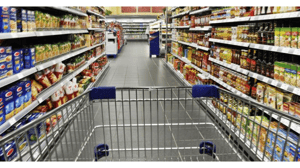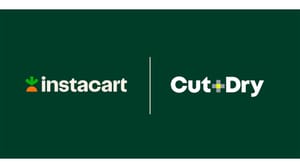HELP YOURSELF
Automated self-service has become a way of life for many Americans. For supermarkets wrestling with space, security and personnel issues related to some nonfood categories, kiosks can be a viable solution for DVD rentals, digital photo processing, expensive products like iPods, health information, coin sorting, gift cards and, the latest entry, prescription refill pick up. Ease of use of new generations
November 26, 2007
CHRISTINE BLANK
Automated self-service has become a way of life for many Americans.
For supermarkets wrestling with space, security and personnel issues related to some nonfood categories, kiosks can be a viable solution for DVD rentals, digital photo processing, expensive products like iPods, health information, coin sorting, gift cards and, the latest entry, prescription refill pick up.
Ease of use of new generations of these advanced vending machines makes them more appealing to shoppers than their predecessors. As a result, supermarkets are latching onto the kiosk movement in a big way.
Recognizing this growing self-service trend, Delhaize Group's Bloom format, based in Salisbury, N.C., has placed all of its kiosks — including DVD rental units from Redbox Automated Retail, Oakbrook Terrace, Ill., and photo-printing kiosks from Hewlett-Packard, Palo Alto, Calif. — together at the front of its stores.
“All of our stores group these kiosks together at the front end, at the entrance walls leading to guest services,” said Kathryn Sowers, manager of front-end services and technology for Bloom. The purpose is for convenience for our guests, so they can get all their needs in one location, she added.
“Chains are trying to discover how these things become a medium for sales,” said Robert Passikoff, president of Brand Keys, New York.
In addition, sometimes the front end is the only place to locate kiosks given the limited amount of space for freestanding displays and endcaps, he added.
While most of Bloom's kiosks are at the front of its supermarkets, the retailer's “Breeze” information kiosks, which provide recipes, shopping lists, price checks and children's games, are located throughout its stores. One Bloom store in Virginia Beach also is testing DVD rental kiosks outside the store, a placement that may benefit stores that are not open 24 hours a day.
“Over the past decade, customer expectations regarding convenience have increased faster than any of the brands have been able to keep up with,” said Passikoff.
Bill Bishop, president of consulting firm Willard Bishop in Barrington, Ill., agrees.
“There is a demonstrated, pent-up demand for these things. People can interact so quickly with a machine to satisfy their needs,” he said.
Bishop foresees supermarkets venturing into all types of nonfood kiosks in the near future as a way to “declare themselves in a business area without having to devote 4 to 8 feet of space,” he said.
For example, grocers could put in kiosks that dispense “disposable electronics,” such as cell phone accessories. Another kiosk that would be popular among Baby Boomers and would save space in the department would be a comprehensive oral care kiosk with dental floss, gum care products and other tools, Bishop suggested.
DVD RENTAL BOOMS
DVD rentals in Bloom stores have been so successful that parent chain Food Lion, also based in Salisbury, N.C., may pick up rental units.
“We have had DVD rentals for close to two months now, with an increasing trend of sales. Piloting considerations are being talked about for our Food Lion stores and corporate office,” Sowers said.
Bloom is not alone in its success with DVD rental kiosks. Most major chains, including Safeway and Stop & Shop, have established programs and some have just come on board this year. Some industry observers foresee a day in the near future when nearly every supermarket has a DVD kiosk.
“It's a no-brainer if you're a supermarket. The vendor is going to do everything for free and the basic deal is that supermarkets get 10% of the gross,” said a DVD industry observer.
Loblaw Cos. in Canada plans to roll out DVD kiosks from the New Release, or TNR, Houston, next year and Publix Super Markets, Lakeland, Fla., started testing TNR kiosks in about 270 of its South Florida stores and in stores in its Atlanta division this year.
“Offering DVD rentals while shopping is a natural addition that complements customers' experience while they are shopping for themselves and their families,” said Publix spokesman Dwaine Stevens.
Since it is a test, it is too early to gauge how successful the kiosks have been, Stevens added.
But it is clear that the industry has quickly ramped up from zero machines to an estimated 7,500 DVD kiosks in supermarkets today.
In addition, more consumers are becoming comfortable with picking up a movie along with their groceries or prepared food. The total DVD rental kiosk market is estimated to be worth $8.5 billion by 2011, according to Adams Media Research, Carmel, Calif.
The biggest growth in the DVD rental industry has been in grocery stores, according to Gary Lancina, vice president of marketing for redbox, which has its rental units in about 5,000 stores. Redbox kiosks also are located in McDonald's outlets.
Cross-promotions of DVD rentals with consumer goods manufacturers have helped boost awareness and sales in some stores, he said.
For example, a recent redbox promotion with a major popcorn brand offered shoppers a free DVD rental when they bought a box of popcorn. “There was a significant sales lift for the brand,” Lancina said. Redbox also emails offers for free rentals to encourage use of the machines, which charge $1 a day, with no additional late fee.
PRESCRIPTION PICK-UP
While DVD rental kiosks, digital photo units and informational kiosks are probably the most widespread types of kiosks in supermarkets, a few stores are testing a way to add convenience to their pharmacy departments.
Two Safeway stores and two Giant Food locations are testing ScriptCenter refill prescription pickup kiosks from Asteres, San Diego. Safeway plans to add another six stores by early next year, and two regional grocery chains in California and other chains are expected to sign on next year.
Shoppers can pick up their refill prescription from these kiosks with a user name and password, biometric verification, and a credit card. Prescriptions — available only to customers who register for the program — are placed in the machine in a sealed, bar-coded bag.
The kiosk lets customers of Giant Food, Landover, Md., pick up their prescriptions whenever the store is open and not wait in line, according to John Fegan, senior vice president, pharmacy, for parent Ahold USA, Quincy, Mass. In addition, the technology “will enable our pharmacy staff to have more time to spend with customers who need consultation or additional help,” Fegan said.
“We just did a marketing blitz with Giant and over 100 people signed up in eight days,” said Linda Piney, founder of Asteres.
The supermarkets testing it are finding that the kiosks help retain current pharmacy customers, and get new pharmacy customers, according to Piney. “They are seeing a higher percent of grocery shoppers convert into pharmacy customers, because of the added convenience of getting refill prescriptions 24/7,” Piney said.
The trend is picking up outside the grocery industry as well. Drug chain Duane Reade, New York, has added several refill prescription kiosks. (Goldman Sachs has a non-automated prescription service from Downtown Pharmacy, New York.)
“The notion of having consumers pre-registered and participating in these kinds of services is extremely productive and useful,” said Bruce Kneeland, a pharmacy industry consultant near Valley Forge, Pa.
The service would be particularly welcomed by customers of stores in rural areas, said pharmacy consultant Christopher Thomsen, president of The Thomsen Group in Kansas City, Mo., although it will also be useful in urban centers.
“Rite Aid sees this going in very densely populated areas,” Thomsen said.
At the same time, several technology and social barriers must be overcome before prescription refill kiosks will take off.
“You need to register with the machine five days ahead of time. So, you have to decide five days ahead of time whether you are going to pick up out of the machine or go to the store, and buy a candy bar and pick up your prescription,” Kneeland said.
Consultants are not sure whether the kiosks will generate more store traffic.
“If the patient tried it once, will they come back? Or will they use it after hours for refill pickups only?” Kneeland said.
Another major barrier to further adoption is the fact that each state's pharmacy boards, which must approve the kiosks, have different rules.
Some allow the kiosks to be in use only during hours that the pharmacy is open, and some restrict which medications can be placed in the units. However, Piney said Asteres has regulatory approval of varying degrees in 27 states.
Perhaps the biggest hurdle is the fact that pharmacists want to consult more with their customers.
“Pharmacies are trying to decide which side of the coin they are going to come down on. Do they try to automate and fill more prescriptions, even though the human contact diminishes significantly?” Kneeland said.
About the Author
You May Also Like




